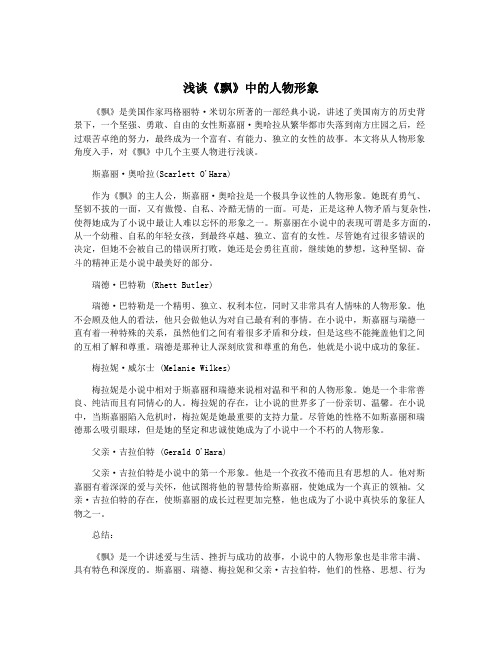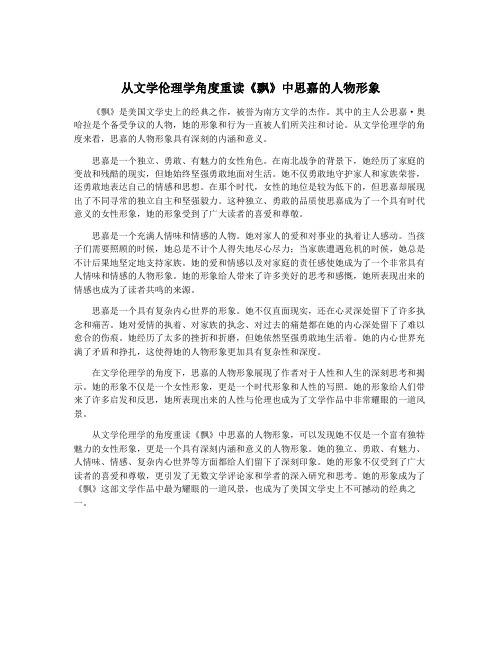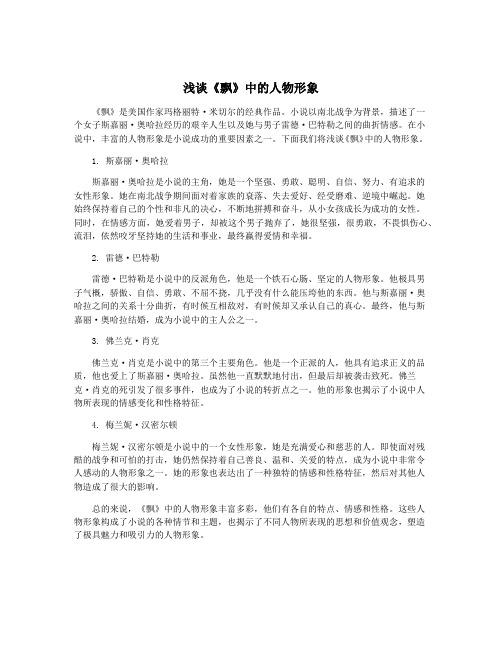飘的主要人物分析
浅谈《飘》中的人物形象

浅谈《飘》中的人物形象《飘》是美国作家玛格丽特·米切尔的代表作品,讲述了南北战争期间南方一个富裕农场主家族的兴衰沉浮。
小说中的人物形象丰富多彩,其中几个重要人物形象深刻鲜明,具有代表性,下面就分别进行分析。
斯嘉丽(Scarlett O'Hara)斯嘉丽是小说中的女主人公,一位勇敢、自信、有决心的女性形象。
斯嘉丽是个头脑清晰、机智灵活的人,有时也会非常霸道,但她总能勇往直前,勇敢地面对各种挑战。
特别是在面对美国南北战争和家族破产的时候,斯嘉丽的韧性和坚强表现得淋漓尽致。
对于她的个性,读者们无法忘记,她的人物形象一直是人们所津津乐道的。
艾希礼(Ashley Wilkes)艾希礼是一个有教养、温柔、文艺的绅士,也是斯嘉丽的青梅竹马。
他是南方种族中精英的代表,教北方人获得教育和文化。
然而,尽管艾希礼一直是斯嘉丽心目中的白马王子,但是在斯嘉丽动情的时候,他仍然只把她当做一个很好的朋友。
最终,他选择了他的妻子梅兰妮,并且与她共同建立家庭,过上幸福美好的生活。
艾希礼的人物形象代表了美国南方社会的精英,认真负责,理智温和。
瑞特·巴特勒(Rhett Butler)瑞特·巴特勒是一个生意人,富有、诙谐、自由。
他是小说中的男主人公,也是斯嘉丽最终爱上的男人。
瑞特·巴特勒虽然没有艾希礼文化和教养,但他非常聪明和机智,能够找到最有效的方法解决问题。
他一直试图改变斯嘉丽的想法,帮助她去适应改变的环境,然而斯嘉丽只是一直在想念艾希礼,拒绝了他的真心。
最终,在家族彻底破裂和梅兰妮的去世之后,瑞特·巴特勒也逐渐离开了斯嘉丽。
瑞特·巴特勒的人物形象代表着南方社会中的一类精英,他们在重振家族和自身财富方面扮演重要角色。
梅兰妮·威尔士(Melanie Wilkes)梅兰妮是一个特别善良、有爱心的女性,也是艾希礼的妻子。
她总是善良地待人,从不攻击别人,也从不向别人施加压力。
浅谈《飘》中的人物形象

浅谈《飘》中的人物形象《飘》是美国作家玛格丽特·米切尔的代表作,讲述了南北战争时期美国南方女性斯佳丽·奥哈拉的生活经历。
小说中塑造了众多丰满而生动的人物形象,其中包括斯佳丽、劳伦斯、梅兰妮、阿希利等。
本文将从以上几个主要人物入手,浅谈他们在小说中的形象。
首先是斯佳丽·奥哈拉,她是小说的女主人公,也是一个非常具有争议性的角色。
斯佳丽个性坚强、果断、机智,充斥着对自由、权力和财富的渴望。
她不接受失败,通过不择手段的手段追求自己的利益。
斯佳丽的形象是复杂而矛盾的,她既是一个富有爱心的母亲,又是一个自私冷酷的女人。
小说通过对斯佳丽的塑造,展现了一个在战乱中艰难生存的女性的形象,也让人们对她有了深入的思考。
劳伦斯·巴尼德是斯佳丽的第一任丈夫,也是她一生中最爱的男人。
劳伦斯是一个风度翩翩、英俊潇洒的男士,但他对斯佳丽的感情是复杂而矛盾的。
他一方面深深地爱着斯佳丽,但另一方面又不能忘记他曾爱过的梅兰妮。
劳伦斯的形象是忧郁而浪漫的,他对斯佳丽的爱意令人动容,但最终还是被他内心对梅兰妮的思念所牵绊。
梅兰妮·威尔克斯是斯佳丽的堂姐,也是一个非常重要的人物。
梅兰妮是一个美丽、善良、善解人意的女性,她对世界充满了乐观和善意。
她是斯佳丽最好的朋友,也是一个被尊重和爱戴的人。
梅兰妮的形象展示了南方传统女性的美德和坚强,她是小说中一个令人敬佩的角色。
阿希利·威尔克斯是梅兰妮的丈夫,也是斯佳丽深深爱恋的男人。
阿希利是一个温文尔雅、文艺复兴的绅士,他具备出色的谈吐和思想深度。
他与斯佳丽之间的吸引力是一种禁忌的爱,因为他已经成为了梅兰妮的丈夫。
阿希利的形象是温柔而理性的,他为人真诚、善良,是一个典型的绅士形象。
《飘》中的人物形象丰满而生动,各具特色,通过他们的多样性和矛盾性,展现了战后南方社会的复杂性以及人性的复杂性。
这些形象不仅仅是小说的角色,更是米切尔对当时南方社会的观察和思考,让读者在阅读中得到了深刻的思考和启发。
浅谈《飘》中的人物形象

浅谈《飘》中的人物形象《飘》是美国作家玛格丽特·米切尔创作的一部经典小说,描绘了美国南北战争时期的南方社会和人物形象。
小说中的人物形象各具特色,鲜明饱满,真实地展现了时代风貌和人性弱点。
小说的主人公斯嘉丽·奥哈拉是一个坚强、聪明、具有顽强生命力的女性形象。
她出身于富裕的南方贵族家庭,拥有美丽的外貌和独立的思想。
她勇敢地面对战争和生活的困难,积极地适应新的社会环境,以自己的智慧和毅力保护和发展家族财富。
她有着与众不同的勇气和独立性,但同时也在感情上表现出顽固和自私的一面。
她的形象展现了女性在当时社会中所面临的挑战和角色定位的转变。
小说中的男主角、罗思·巴特勒是一个矛盾复杂的人物形象。
他是一个勇敢而坚定的军人,在战争中展现出非凡的战略才能和领导力。
他有着尊严和正直的个性,但也有着复仇的欲望和野心。
他对斯嘉丽深情但又无法言说,这使得他一直被她迷住而无法自拔。
罗思的形象展示了一个既有缺点又有优点的复杂人物,在他的人格中融合了战争的残酷和爱情的美好。
小说中还有其他各色人物形象,如美丽善良的梅兰妮、精明能干的阿什利以及风趣幽默的巴西尔等。
他们都具有鲜明的个性特点和丰富的内在世界,使得小说充满了生机和色彩。
这些人物形象展示了当时南方社会中的各个群体和个体的生活状态和心理状况,使得小说更具有代表性和真实性。
《飘》中的人物形象丰富多样,真实地反映了当时南方社会中的人物类型和风貌。
作者通过细腻的描写和对话,生动地塑造了每个人物的特点和性格,使得读者可以对他们有深刻的印象。
这些人物形象不仅展现了当时南方社会的风貌和特点,更深入地探讨了人性的复杂性和多面性,引发了人们对爱情、责任、道德和价值观念的思考。
浅谈《飘》中的人物形象

浅谈《飘》中的人物形象《飘》是美国作家玛格丽特·米切尔所著的一部经典小说,讲述了美国南方的历史背景下,一个坚强、勇敢、自由的女性斯嘉丽·奥哈拉从繁华都市失落到南方庄园之后,经过艰苦卓绝的努力,最终成为一个富有、有能力、独立的女性的故事。
本文将从人物形象角度入手,对《飘》中几个主要人物进行浅谈。
斯嘉丽·奥哈拉(Scarlett O'Hara)作为《飘》的主人公,斯嘉丽·奥哈拉是一个极具争议性的人物形象。
她既有勇气、坚韧不拔的一面,又有傲慢、自私、冷酷无情的一面。
可是,正是这种人物矛盾与复杂性,使得她成为了小说中最让人难以忘怀的形象之一。
斯嘉丽在小说中的表现可谓是多方面的,从一个幼稚、自私的年轻女孩,到最终卓越、独立、富有的女性。
尽管她有过很多错误的决定,但她不会被自己的错误所打败,她还是会勇往直前,继续她的梦想,这种坚韧、奋斗的精神正是小说中最美好的部分。
瑞德·巴特勒 (Rhett Butler)瑞德·巴特勒是一个精明、独立、权利本位,同时又非常具有人情味的人物形象。
他不会顾及他人的看法,他只会做他认为对自己最有利的事情。
在小说中,斯嘉丽与瑞德一直有着一种特殊的关系,虽然他们之间有着很多矛盾和分歧,但是这些不能掩盖他们之间的互相了解和尊重。
瑞德是那种让人深刻欣赏和尊重的角色,他就是小说中成功的象征。
梅拉妮·威尔士 (Melanie Wilkes)梅拉妮是小说中相对于斯嘉丽和瑞德来说相对温和平和的人物形象。
她是一个非常善良、纯洁而且有同情心的人。
梅拉妮的存在,让小说的世界多了一份亲切、温馨。
在小说中,当斯嘉丽陷入危机时,梅拉妮是她最重要的支持力量。
尽管她的性格不如斯嘉丽和瑞德那么吸引眼球,但是她的坚定和忠诚使她成为了小说中一个不朽的人物形象。
父亲·吉拉伯特 (Gerald O'Hara)父亲·吉拉伯特是小说中的第一个形象。
浅谈《飘》中的人物形象

浅谈《飘》中的人物形象《飘》是美国作家玛格丽特·米切尔的代表作之一,也是美国南方文学的经典之作。
小说以美国南北战争为背景,讲述了一个关于爱情、战争和人生选择的故事。
小说中涉及众多的人物形象,每个人物都鲜明独特,深入人心。
下面将对几个主要人物形象进行浅谈。
斯嘉丽·欧哈拉是小说的女主角,她是一个极具魅力的女性形象。
斯嘉丽生于美国南方一个贵族家庭,从小被宠爱着。
她美丽聪明,野心勃勃,梦想过上富有奢侈的生活。
当家族的城府化为狼烟,战争影响到了她的生活时,斯嘉丽不得不学会面对现实,也逐渐成熟起来。
她敢于面对困难和挑战,表现出了强大的生存能力。
她不会为了他人而改变自己,她追求的是自己想要的生活。
她的形象凸显了女性的坚强和独立。
阿希利·威尔士是小说中的男主角,他是一个典型的绅士形象。
阿希利儒雅文雅,风度翩翩,他代表了传统的南方绅士的形象。
他善良温和,骑马射箭技艺高超,深受社会的尊敬和爱戴。
阿希利对政治和社会事务并不感兴趣,他更喜欢追求宁静的生活。
他不愿意参与战争,但最终还是加入了南方军队,这是因为他对家乡和家人深爱之情的体现,也是对传统伦理观念的坚守。
阿希利的形象象征着传统的英雄气概和南方绅士风度。
瑞克·巴特勒是斯嘉丽的第二任丈夫,他是一个具有男子汉风范的形象。
瑞克是一个冒险家,他冷静勇敢,机智过人。
他是一个势利眼,追求金钱和权力的私生子,但在战争的洗礼下,他展现了强大的勇气和智慧。
他对斯嘉丽几乎是一见钟情,不顾一切地追求她。
瑞克的形象体现了男子汉的阳刚之气和冒险精神,揭示了斯嘉丽的内心渴望。
梅琳·汉尼基是阿希利的妻子,她是一个纯洁善良的女性形象。
梅琳是一个贤淑美丽,富有爱心和同理心的女人。
她对待每个人都充满关怀和善意,尤其对待贝尔塔(斯嘉丽的丈夫之一)的孩子们更是无微不至。
梅琳对待战争和社会变迁的态度一直是积极乐观的,她相信和平和善意的力量。
梅琳的形象代表了传统的女性美德和人性中的善良和宽容。
浅谈《飘》中的人物形象

浅谈《飘》中的人物形象《飘》是美国作家玛格丽特·米切尔所著的一部长篇小说,讲述了美国南北战争时期南方一个名叫斯卡伟特(Scarlett)的女人的故事。
在小说中,作者通过对斯卡伟特及其他一些人物的描写,塑造了一系列鲜明的人物形象,展现了他们的性格、价值观和生活态度。
斯卡伟特是小说的主角,是一个充满魅力且不拘小节的女人。
她心机深沉,独立坚强,有着顽强的生存意志。
她勇敢地面对南北战争带来的破坏,努力经营自己的家庭与事业,并在经历了多次失败后依然保持乐观和积极向上的态度。
斯卡伟特的形象在小说中是复杂而矛盾的,她既有着自私和冷酷的一面,又有着拼搏和追求幸福的一面。
她不拘于传统的女性角色,展示了女性在当时社会中的自主和坚韧。
阿仁(Rhett Butler)是另一个重要的人物形象,也是斯卡伟特的丈夫。
阿仁是一个充满魅力且有着叛逆精神的人。
他对传统的社会规范不屑一顾,有着别致的行为态度和独立的思考方式。
他是个商人,懂得利用战争时期的机会积累财富。
尽管他的行径经常被社会所指责,他依然坚持自己的信念,从不随波逐流。
阿仁的形象在小说中象征着个人的追求与自由意志,给人以启示和鼓舞。
其他一些次要角色也给人留下了深刻的印象。
梅琳(Melanie)是斯卡伟特的好友,她是个善良和宽厚的妇女。
她一直坚守着她对家庭价值观的信仰,并在战争和困境中表现出了巨大的勇气和毅力。
梅琳的形象在小说中是一种美德的象征,她的坚持和善良给了其他人希望和支持。
还有个别人物表示拥护奴隶制度及地主阶级的价值观,表明南方贵族的传统和对土地的痴迷。
这些形象传达了当时南方社会的复杂性和矛盾性。
玛格丽特·米切尔通过《飘》中各个人物的形象刻画,描绘了一个充满动荡和变化的时代背景,展示了战争给人们生活带来的种种困境与改变。
小说中的人物形象丰富多样,既有善良和正直的角色,也有复杂和矛盾的角色,他们的思想和行为反映了当时南方社会的多样性和变化。
通过这些人物形象,读者能够更好地理解当时的历史和社会环境,也能够更深入地思考人类的可塑性和复杂性。
浅谈《飘》中的人物形象

浅谈《飘》中的人物形象《飘》是美国作家玛格丽特·米切尔的代表作,也是世界文学史上最为著名的小说之一。
小说以美国南北战争时期为背景,描绘了一个充满激烈情感和争斗的南方社会。
在小说中,作者塑造了一系列鲜明的人物形象,这些人物形象各具特色,为故事的发展和情节的展开提供了丰富多彩的线索和支撑。
本文将对《飘》中的人物形象进行浅谈,分别从斯嘉丽、瑞德、梅兰妮、阿帕奇、阿什利等几个角色展开分析。
斯嘉丽是《飘》中最为鲜明和令人难忘的人物之一。
她出生在一个南方贵族家庭,聪明、机智、勇敢,但也自私、刻薄和自私。
她一生中经历了许多戏剧性的转变,从一个单纯的少女变成了一个女强人。
在南北战争期间,斯嘉丽承担起家族的重任,她利用自己的聪明才智和胆识,保住了自己的家族和地产。
她坚强的意志和永不放弃的信念,在很大程度上塑造了她的形象。
斯嘉丽也是一个充满矛盾和隐秘的女性形象,她对阿什利一往情深,却又与瑞德结婚,她为家庭和事业奋斗,却又不断地追求财富和地位。
斯嘉丽的人物形象具有复杂性和深度,给读者留下了深刻的印象。
瑞德是另一个备受关注的人物形象。
他是斯嘉丽的第一任丈夫,也是一个极具魅力和野心的男人。
瑞德出身贫苦,靠着自己的聪明才智和机会,成为了富甲一方的商人。
他是一个典型的南方绅士,热情豪爽,但也有着执着和冷酷的一面。
在小说中,瑞德的形象展现了南方社会的内在矛盾和复杂性,他既有着家族荣耀和忠诚的传统观念,也有着个人奋斗和成功的野心。
他与斯嘉丽之间的纠葛和争斗,展现了南方社会的斗争和挣扎,对整个故事情节起到了重要的推动作用。
梅兰妮也是一个令人难忘的人物形象。
她是斯嘉丽的堂妹,也是一个典型的南方淑女,善良、温柔、忠诚。
梅兰妮的形象展现了南方传统家庭观念和女性美德,她对家庭和丈夫忠诚不渝,对他人宽容和体贴。
在战争期间,梅兰妮一直保持着乐观和善良的态度,给予他人鼓励和支持,成为了许多读者心中的形象代表。
梅兰妮的形象在小说中是一个完美的化身,她体现了传统的美德和家庭观念,同时也展现了南方女性的坚韧和勇敢。
浅谈《飘》中的人物形象

浅谈《飘》中的人物形象《飘》是美国作家玛格丽特·米切尔的代表作之一,小说以南北战争及重建时期的美国为背景,讲述了一个女主人公斯嘉丽·奥哈拉的生活故事。
小说中的人物形象丰满鲜活,深受读者喜爱。
本文将从斯嘉丽、艾希礼、梅兰妮和雪莉等几个人物形象入手,浅谈《飘》中的人物形象。
斯嘉丽·奥哈拉是整部小说的核心人物,也是最为鲜明且引人注目的形象之一。
她是一个勇敢、机智而又有母性的女性,她拥有非凡的意志力和生存能力。
在南北战争期间,她不仅是一个坚强的生存者,还创造了很多新的商业机会。
她勇敢地面对挑战,不畏艰难困苦,敢于冒险。
斯嘉丽还有一个独特的“顾家深情”,她对于家庭的责任感和爱的承诺使她成为一个不折不扣的母亲与妻子。
斯嘉丽的形象塑造了一个坚强而又复杂的女性形象,让人们深受感动。
阿希礼·威尔士是斯嘉丽的一个重要对手和朋友,也是一个非常有个人魅力的人物形象。
阿希礼是一个温柔、绅士和有责任心的男性,他体现了绅士的风度和正义感。
在他的身上,我们可以看到一个真正的南方绅士的特质,他尊重女性、珍惜友谊,有着高尚的品德和行为准则。
他对斯嘉丽表达了深深的爱意,并一直默默地守护着她。
阿希礼是一个值得敬重和崇拜的男性形象,他的形象给人们以力量和希望。
梅兰妮·汉密尔顿是斯嘉丽最好的朋友,也是一个令人敬佩的人物形象。
梅兰妮是一个典型的南方女性,善良、纯洁而又善解人意。
梅兰妮对每个人都充满了爱,她以她的善良和宽容感动着每个人,成为了一个真正的天使。
尽管梅兰妮有时被当作斯嘉丽的对立面,但她的亲情、友情和善良给了斯嘉丽不少启示和动力。
她的形象使人们对善良与纯真有了更深的思考与理解。
雪莉·奎特姆是一个鲜明的反面人物,但也是小说的重要形象之一。
雪莉是一个放荡不羁、自私自利的女性,她通过婚姻来获取地位和财富,不惜一切代价。
她缺乏真正的爱情和家庭观念,只追求着物质的满足和社会地位的提升。
从文学伦理学角度重读《飘》中思嘉的人物形象

从文学伦理学角度重读《飘》中思嘉的人物形象《飘》是美国文学史上的经典之作,被誉为南方文学的杰作。
其中的主人公思嘉·奥哈拉是个备受争议的人物,她的形象和行为一直被人们所关注和讨论。
从文学伦理学的角度来看,思嘉的人物形象具有深刻的内涵和意义。
思嘉是一个独立、勇敢、有魅力的女性角色。
在南北战争的背景下,她经历了家庭的变故和残酷的现实,但她始终坚强勇敢地面对生活。
她不仅勇敢地守护家人和家族荣誉,还勇敢地表达自己的情感和思想。
在那个时代,女性的地位是较为低下的,但思嘉却展现出了不同寻常的独立自主和坚强毅力。
这种独立、勇敢的品质使思嘉成为了一个具有时代意义的女性形象,她的形象受到了广大读者的喜爱和尊敬。
思嘉是一个充满人情味和情感的人物。
她对家人的爱和对事业的执着让人感动。
当孩子们需要照顾的时候,她总是不计个人得失地尽心尽力;当家族遭遇危机的时候,她总是不计后果地坚定地支持家族。
她的爱和情感以及对家庭的责任感使她成为了一个非常具有人情味和情感的人物形象。
她的形象给人带来了许多美好的思考和感慨,她所表现出来的情感也成为了读者共鸣的来源。
思嘉是一个具有复杂内心世界的形象。
她不仅直面现实,还在心灵深处留下了许多执念和痛苦。
她对爱情的执着、对家族的执念、对过去的痛楚都在她的内心深处留下了难以愈合的伤痕。
她经历了太多的挫折和折磨,但她依然坚强勇敢地生活着。
她的内心世界充满了矛盾和挣扎,这使得她的人物形象更加具有复杂性和深度。
在文学伦理学的角度下,思嘉的人物形象展现了作者对于人性和人生的深刻思考和揭示。
她的形象不仅是一个女性形象,更是一个时代形象和人性的写照。
她的形象给人们带来了许多启发和反思,她所表现出来的人性与伦理也成为了文学作品中非常耀眼的一道风景。
从文学伦理学的角度重读《飘》中思嘉的人物形象,可以发现她不仅是一个富有独特魅力的女性形象,更是一个具有深刻内涵和意义的人物形象。
她的独立、勇敢、有魅力、人情味、情感、复杂内心世界等方面都给人们留下了深刻印象。
浅谈《飘》中的人物形象

浅谈《飘》中的人物形象《飘》是美国作家玛格丽特·米切尔创作的一部具有广泛影响力的小说,该小说以南北战争为背景,讲述了一个充满激情、欲望与悲剧的故事。
小说中的人物形象丰富多彩,他们性格各异,引人深思。
在本文中,我们将深入探讨《飘》中一些重要的人物形象,探讨他们的性格、特点以及对故事情节的影响。
我们不得不提到小说的主角——斯佳丽·奥哈拉。
斯佳丽是一个令人难忘的女性形象,她美丽、聪慧、勇敢、坚韧,并且有着敏锐的商业头脑。
在南北战争期间,她经历了家庭的破碎、爱情的离奇和财富的丧失,但依然能够坚强地活下去。
斯佳丽的形象展现了女性的独立和坚强,她不顾一切地追求自己的幸福和利益,展示了一种全新的女性形象,给人留下了深刻的印象。
与斯佳丽形成鲜明对比的是她的玩伴、好友梅兰妮·汉密尔顿。
梅兰妮是一个善良、温柔、纯洁的女性形象,她与斯佳丽截然不同,但却在故事中扮演了非常重要的角色。
作为斯佳丽的朋友,梅兰妮默默地支持着她,用自己的善良和宽容温暖着斯佳丽的内心。
梅兰妮的形象代表了传统的女性美德,她的存在平衡了斯佳丽的叛逆与狂放,使整个故事更加丰富和多元化。
除了这两位女性形象,小说中还有一个值得关注的男性角色——瑞德·巴特勒。
瑞德是一个充满魅力、野心勃勃的男性形象,他在故事中扮演了斯佳丽的情感纠葛的另一半。
瑞德与斯佳丽一样,都是顽强、坚毅的个体,他们之间的爱情故事充满了荆棘与波折。
瑞德的形象展现了男性的果断和冷静,他的出现使得整个故事更加扣人心弦。
除了这几位主要人物之外,小说中还有一些次要但同样引人注目的角色,比如梅尔尼的丈夫、斯佳丽的丈夫弗兰克、瑞德的妻子等等。
他们都各自有着独特的性格特点,对整个故事情节都产生了不可忽视的影响。
《飘》中的人物形象丰富多彩,他们各自有着鲜明的个性和特点,相互交织,共同构成了一幅栩栩如生的人物画卷。
每一个人物都有自己的使命和命运,在故事中扮演着不可或缺的角色。
浅谈《飘》中的人物形象

浅谈《飘》中的人物形象《飘》是美国作家玛格丽特·米切尔创作的长篇小说,以南北战争背景为背景,讲述了一个富有女主人翁斯嘉丽·欧哈拉的一生。
小说中有许多鲜明的人物形象,他们都是作者精心塑造的角色,每个人物都具有鲜明的性格特点和生动的身世背景。
本文将从斯嘉丽、瑞德、梅兰妮和阿什利四个主要人物出发,浅谈《飘》中的人物形象。
首先是女主人公斯嘉丽·欧哈拉,她是一个性格坚强、聪明机智、勇敢无畏的女性形象。
斯嘉丽出生在一个南方贵族家庭,自幼就展现出坚韧不拔的性格。
她热爱田园生活,渴望得到阿什利的爱情,然而在美丽的爱丽丝和善良的梅兰妮的围绕下,她无法得到阿什利的爱情,令她倍感失落与委屈。
而当南北战争爆发,她经历了家园的沦陷、亲友的离散和无尽的磨难,斯嘉丽却没有因此放弃,反而在逆境中展现出顽强的生存本能和永不言弃的毅力。
她刻苦耐劳,一路拼搏奋斗,最终站在了成功者的一方。
斯嘉丽的形象展现了女性坚强、独立、有勇气的一面,她是一个永远不满足于现状,不断追求更好生活的女性典范。
其次是瑞德·巴特勒,一个坚毅果敢、胸怀坦荡的男性形象。
瑞德是一个典型的南方绅士,尽管他喜欢追求逍遥自在的生活,但在南北战争期间,他主动加入了南方军队,成为了一名忠诚的士兵。
瑞德在战争中经历了许多惨痛的折磨和损失,但他依然坚守着自己的信念,为了家人和爱情,他竭尽所能,甚至不惜一切代价去保护他们。
在斯嘉丽最需要帮助的时候,瑞德总是出现在她身边,给予她无私的支持和保护。
在小说的结尾,瑞德和斯嘉丽最终走到了一起,展现出了坚定不移的爱情和责任感。
瑞德是一个充满男子气概的男性形象,他展现了忠诚、勇敢和正直的一面,是一个令人敬仰的男性典范。
接下来是梅兰妮·威尔克斯,一个善良柔情、忠诚纯洁的女性形象。
梅兰妮是斯嘉丽的堂姐,也是她最好的朋友。
她拥有着一颗善良纯洁的心灵,对待亲友始终如一,永远以人们的优点来看待他们。
在战争期间,她尽职尽责地照顾伤病士兵,展现出了坚忍不拔的毅力。
浅谈《飘》中的人物形象

浅谈《飘》中的人物形象《飘》是一部经典的文学作品,它以美国南方内战前后的历史背景为背景,深刻描绘了各个人物的形象。
以下我将就《飘》中的几个主要人物形象进行浅谈。
首先是小说的主人公斯嘉丽·奥哈拉。
她是一个强大而独立的女性形象,勇敢地面对战争与逆境。
她身上具有南方女性的坚强和顽强,她没有娇弱的品性,而是善于利用自己的智慧和勇气去追求自己的幸福。
虽然在情感上她是一个失意的女人,但她从未放弃对自己幸福的追求,在抗争与失败中坚持着自己的信念。
第二个人物是瑞德·巴特勒,他是斯嘉丽的第一个丈夫。
瑞德有着南方男性的刚毅与自豪,他为人正直、诚实,是斯嘉丽最信赖的人。
他对斯嘉丽有着深沉的爱,但在南北战争中他加入了军队,几年后才返回家中,已经发生了许多变化。
他变得冷酷而无情,而斯嘉丽在这一切面前变得微不足道。
瑞德的形象展示了战争对人性的摧残与破坏,同时也凸显了爱情的脆弱与不堪一击。
另一个重要的人物是阿什利·威尔克斯,他是斯嘉丽早年的深爱之人。
阿什利是一个绅士,他有着温和、善良的性格,深受斯嘉丽的喜爱。
他却对她无法付出真感情,因为他理智地选择了嫁给了梅兰妮,这让斯嘉丽非常痛苦。
阿什利的形象展示了传统南方绅士的品质,但也暴露了他们在爱情面前的困惑与无奈。
最后一个人物是梅兰妮·威尔克斯,她是阿什利的妻子,也是斯嘉丽的好友。
梅兰妮是一个典型的南方淑女,她善良、宽容,对任何人都抱有最美好的希望。
她对斯嘉丽一直保持着友情和善意,即使在斯嘉丽心怀嫉妒之时,也会主动给予帮助和支持。
梅兰妮的形象展示了南方女性的优雅和母性的美德,她的存在给予了整个小说一丝温暖与平衡。
通过对这些人物形象的分析可以看出,《飘》不仅展现了一个时代的背景,更通过鲜明的人物形象展示了人性的复杂性和对幸福的追求。
这些人物形象通过丰富的情感与个性,赋予了小说以深刻的内涵,使整个故事更具感染力与意义。
浅谈《飘》中的人物形象

浅谈《飘》中的人物形象《飘》是美国作家玛格丽特·米切尔创作的一部长篇小说,讲述了南北战争期间一个坚强、独立的南方女性斯佳丽·奥哈拉的故事。
小说中塑造了众多独特的人物形象,包括斯佳丽、瑞德·巴特勒、阿什利·威尔克斯等等。
本文将从几个主要人物来谈论《飘》中的人物形象。
斯佳丽·奥哈拉是《飘》中最具代表性的人物之一,也是小说的女主角。
她是一个强烈的女性形象,她有着坚强的意志力和不屈的韧性。
在南北战争的动荡时期,她失去了许多亲人,生活发生了巨大的变化。
她并没有沉沦于悲伤和痛苦之中,而是努力寻求自己的幸福。
斯佳丽以自己的智慧和勇气,迎接了生活的挑战,不断地努力赚钱,守护自己的家人。
她是一个完整的人物形象,既有复杂的内心和情感,又有坚强的外表和行为。
瑞德·巴特勒是一个非常有魅力的人物。
他是斯佳丽的第二个丈夫,拥有着迷人的外表和出色的社交能力。
瑞德是一个有责任感的人,他深爱着斯佳丽,并始终支持和保护她。
他在家族企业上表现出了出色的经营才能,并在困难时期帮助许多人。
尽管他不是一个典型的绅士,却仍然受到许多人的尊重和崇拜。
瑞德的形象展示了男性的魅力和坚定的胆识。
阿什利·威尔克斯是斯佳丽的初恋对象,也是一个非常重要的人物形象。
阿什利是一个文雅优雅、有教养的绅士,他是斯佳丽心中的理想男人。
阿什利却选择了结婚和斯佳丽迥异的妻子梅兰妮。
阿什利的形象不仅展示了一个追求精神生活的男人,也揭示了社会对传统道德和责任的重视。
尽管他不是一个完美的角色,但他在小说中扮演了承载着斯佳丽与社会价值观之间矛盾的象征。
《飘》中的人物形象丰满且独特。
主人公斯佳丽·奥哈拉以她的坚强意志和勇气展示出了一个不屈不挠的女性形象;瑞德·巴特勒和阿什利·威尔克斯则分别展示了男性的魅力和追求精神生活的特点。
这些人物形象使得小说更加具有深度和吸引力,并且带给读者深刻的思考和启示。
浅谈《飘》中的人物形象

浅谈《飘》中的人物形象《飘》是美国作家玛格丽特·米切尔创作的一部经典小说,描写了南北战争期间、美国南方故事的发生地亚特兰大的一段故事。
小说通过描绘女主人公斯嘉丽·奥哈拉和她的亲友们的生活,展现了世态炎凉、爱憎分明的南部社会风貌。
小说中塑造了众多丰满、个性鲜明的人物形象,包括斯嘉丽、瑞特、梅兰妮、阿希礼、贝尔克等人。
他们各具特色,相互交织,为整个故事增添了色彩和魅力。
本文将从几个代表性的角色入手,探讨他们所代表的意义和形象塑造。
斯嘉丽·奥哈拉是《飘》中最具魅力的人物之一,她是一个坚强无比,富有智慧和野心的女性形象。
斯嘉丽出身南部贵族家庭,她美丽、聪明,懂得如何运用自己的优势,但她也有缺点和弱点。
她对自己心仪的男性埋没了自己的感情,痛苦地甚至无法自拔。
她看似自私和冷酷,但她的内心深处,却充满了对南部的热爱以及对过去的怀念。
斯嘉丽的形象揭示了战争对人性的冲击和伤害,她的强大和脆弱相互交织,使她成为小说中一个最有代表性的形象。
梅兰妮·威尔克斯是小说中的另一个重要人物形象。
梅兰妮是斯嘉丽的好友,她是一个善良、温和、一直信奉传统价值观的女性形象。
梅兰妮是一个传统的南方女性,她对家庭、善良和忠诚有着独到的理解和追求,并通过自己的坚持,影响和改变了周围人的生活。
梅兰妮的存在将斯嘉丽从一种极端的形象转变为另一种极端,她代表了传统南方士族的价值观和稳定。
阿希礼·威尔克斯是斯嘉丽的第二任丈夫,一个充满理想主义的梦想家。
阿希礼是一个广受欢迎和尊敬的南方骑士,他坚持保住南方文化和传统,对自由和独立抱有浓厚的热情。
他的形象体现了南方人民对抗北方侵略的决心和勇气,同时也暴露了南方人对现实的无奈和无力感。
贝尔克·巴特勒是一个非典型的主人公形象。
他是斯嘉丽的终身挚友,一个卓越的战士和商人。
贝尔克是《飘》中最具原则和责任感的人物,他深爱斯嘉丽,但又远远超越了自己的爱情。
贝尔克的形象体现了一种坚定和正直的品质,同时也展示了南方反抗北方压迫的勇气。
浅谈《飘》中的人物形象

浅谈《飘》中的人物形象1. 引言1.1 介绍《飘》的背景和主要人物角色《飘》是美国作家玛格丽特·米切尔创作的一部经典小说,于1936年首次出版。
小说以南北战争和重建时期的美国南部为背景,讲述了一个富有冲突和戏剧性的故事。
在小说中,塔拉庄园的继承人斯嘉丽·奥哈拉是一个勇敢而坚强的女性,她努力保护自己的家人和财产。
瑞德·巴特勒是一个帅气而魅力四射的军官,他与斯嘉丽之间发展出一段错综复杂的感情关系。
艾希礼是一个温柔善良的女性,她对梅兰妮·威尔克斯展现出无私的友爱。
梅兰妮·威尔克斯是一个纯洁善良的女性,她对生活充满信念和乐观。
阿什利·威尔克斯是一个文雅而优雅的绅士,他与斯嘉丽之间有着微妙而复杂的情感纠葛。
这些主要人物角色在小说中展现出丰富多彩的个性特征和情感纠葛,为故事的发展增添了深度和复杂性。
【引言:介绍《飘》的背景和主要人物角色】2. 正文2.1 斯嘉丽·奥哈拉的形象斯嘉丽·奥哈拉是《飘》中的主角之一,她是一个充满活力和野心的女性形象。
她拥有美丽的外表和坚强的意志力,常常通过自己的努力和勇气来追求自己的目标。
斯嘉丽在整个小说中展现出了对权力和财富的渴望,以及为了达到目的不择手段的一面。
她可以看做是一个复杂的角色,既有着善良的一面,也有着自私和冷酷的一面。
斯嘉丽的形象在小说中得到了深刻的刻画,读者可以看到她在各种复杂情况下的反应和决定。
她对艾希礼的爱情,对梅兰妮的友情,以及对阿什利的迷恋,都展现了她内心的矛盾和挣扎。
斯嘉丽的人物形象不仅仅是一个简单的英雄或反派,她是一个充满矛盾与冲突的角色,这也使得她成为小说中最吸引人的人物之一。
斯嘉丽·奥哈拉是《飘》中一个极具个性和魅力的人物形象。
她的复杂性和矛盾性使得她变得丰满而深刻,同时也为整个故事增添了许多戏剧性和张力。
她对其他人物的影响和作用也是不可忽视的,她的决定和行为对整个情节的发展产生了重要的影响。
浅谈《飘》中的人物形象

浅谈《飘》中的人物形象《飘》是美国作家玛格丽特·米切尔创作的一部长篇小说,以美国南北战争期间为背景,讲述了主人公斯嘉丽·奥哈拉的一生。
小说中塑造了许多生动的人物形象,各具特色,不同的背景和性格使得这些人物形象更加丰满和真实。
本文将重点对几个主要人物进行形象分析。
斯嘉丽·奥哈拉是整部小说的主人公,也是最为复杂和深刻的人物形象之一。
她是一个充满了矛盾与韧劲的女性形象。
从外表上看,她是一个非常美丽和迷人的女人,但她的内心却充满了贪婪和野心。
她为了保护自己的家园塔拉庄园,义无反顾地嫁给了自己不爱的人,而当她真正爱上了犹豫不决的阿希利时,她又不顾一切地追求自己的幸福。
斯嘉丽的身上展现了美丽与丑陋,善良与自私的两面,这使得她成为了一个复杂而真实的人物形象。
阿希利·威尔克斯是斯嘉丽的第二任丈夫,也是一个备受争议的人物形象。
阿希利是一个温和善良的男性,同时也是一个胆小懦弱的人。
他宁愿逃避现实,对南北战争也持中立的立场,这让斯嘉丽感到非常不满。
虽然阿希利一直是斯嘉丽心中的白马王子,但他并没有像她预期的那样坚强和果断。
阿希利的形象反映了时代背景下男性的软弱和动摇,也暗示了南方农奴主的衰落和终结。
梅兰妮·哈米尔顿是斯嘉丽的挚友和阿希利的第一任妻子,也是一个善良坚强的女性形象。
梅兰妮是一个充满慈爱和关怀的人,她总是为他人着想,从不计较个人得失。
她对阿希利的深情和对斯嘉丽的忠诚使她成为小说中最受欢迎的人物之一。
梅兰妮的形象展现了那个时代女性应有的贤德和忍让,她是斯嘉丽心中的对比,也是她渴望变得更好的一个榜样。
瑞特·巴特勒是一个外表粗野但内心善良的人物形象。
瑞特是一个成功的商人,他对斯嘉丽展现出了深深的爱恋和呵护。
他的野心和决心使他在商业上取得了巨大的成功,同时他也是一个非常慷慨和大方的人。
瑞特的形象呈现出了南方男性身上的野性和自由,也揭示了南方男人追求成功的渴望和自尊心。
分享《飘》的理由

《飘》是一部经典的长篇小说,由美国作家玛格丽特·米切尔创作。
这本书以美国南北战争时期为背景,讲述了一个南方贵族女性斯嘉丽·奥哈拉顽强生存和奋斗的故事。
分享《飘》的理由如下:
1. 人物鲜明:小说中的主人公斯嘉丽·奥哈拉是一位充满矛盾、勇敢面对生活困境的女性。
她顽强、聪明、独立,但又充满野心和自私。
这种复杂的性格使得她成为了一个令人难忘的角色。
2. 情节丰富:《飘》的故事情节跌宕起伏,充满了战争、爱情、家族纷争等元素。
读者在阅读过程中会被斯嘉丽的生活经历所吸引,感受到那个时代的风貌和人们的生活。
3. 历史背景:《飘》以美国南北战争时期为背景,展现了那个时代的风貌和社会变革。
通过阅读这部作品,读者可以了解美国历史上的这一重要时期,以及战争对人们生活的影响。
4. 生活哲理:《飘》讲述了斯嘉丽在生活中不断追求幸福,为生存而奋斗的过程。
她在面对困境时展现出顽强的毅力,这给读者带来了生活的启示,教会我们如何面对生活中的困难和挑战。
5. 文学价值:《飘》作为一部经典文学作品,具有很高的艺术价值。
作者玛格丽特·米切尔的写作风格独特,文字优美,使得这部作品成为了文学史上的经典之作。
综上所述,《飘》是一部具有很高文学价值和人文内涵的经典小说。
分享《飘》可以带给读者丰富的阅读体验,以及对于人性和生活的深刻思考。
浅谈《飘》中的人物形象

浅谈《飘》中的人物形象《飘》是美国作家玛格丽特·米切尔的经典作品。
小说以南北战争为背景,描述了一个女子斯嘉丽·奥哈拉经历的艰辛人生以及她与男子雷德·巴特勒之间的曲折情感。
在小说中,丰富的人物形象是小说成功的重要因素之一。
下面我们将浅谈《飘》中的人物形象。
1. 斯嘉丽·奥哈拉斯嘉丽·奥哈拉是小说的主角,她是一个坚强、勇敢、聪明、自信、努力、有追求的女性形象。
她在南北战争期间面对着家族的衰落、失去爱好、经受磨难、逆境中崛起。
她始终保持着自己的个性和非凡的决心,不断地拼搏和奋斗,从小女孩成长为成功的女性。
同时,在情感方面,她爱着男子,却被这个男子抛弃了,她很坚强,很勇敢,不畏惧伤心、流泪,依然咬牙坚持她的生活和事业,最终赢得爱情和幸福。
2. 雷德·巴特勒雷德·巴特勒是小说中的反派角色,他是一个铁石心肠、坚定的人物形象。
他极具男子气概,骄傲、自信、勇敢、不屈不挠,几乎没有什么能压垮他的东西。
他与斯嘉丽·奥哈拉之间的关系十分曲折,有时候互相敌对,有时候却又承认自己的真心。
最终,他与斯嘉丽·奥哈拉结婚,成为小说中的主人公之一。
3. 佛兰克·肖克佛兰克·肖克是小说中的第三个主要角色。
他是一个正派的人,他具有追求正义的品质,他也爱上了斯嘉丽·奥哈拉。
虽然他一直默默地付出,但最后却被袭击致死。
佛兰克·肖克的死引发了很多事件,也成为了小说的转折点之一。
他的形象也揭示了小说中人物所表现的情感变化和性格特征。
4. 梅兰妮·汉密尔顿梅兰妮·汉密尔顿是小说中的一个女性形象,她是充满爱心和慈悲的人。
即使面对残酷的战争和可怕的打击,她仍然保持着自己善良、温和、关爱的特点,成为小说中非常令人感动的人物形象之一。
她的形象也表达出了一种独特的情感和性格特征,然后对其他人物造成了很大的影响。
浅析《飘》中主要人物性格形象

浅析《飘》中主要⼈物性格形象浅析《飘》中主要⼈物性格形象 《飘》是美国作家玛格丽特·⽶切尔创作的长篇⼩说,该作1937年获得普利策⽂学奖。
⼩说以亚特兰⼤以及附近的⼀个种植园为故事场景,描绘了内战前后美国南⽅⼈的⽣活,以下是⼩编为⼤家整理的浅析《飘》中主要⼈物性格形象,希望对你有所帮助! 摘要:《飘》这部⼩说的⼥主⼈公是斯嘉丽,整篇⼩说以⼥主⼈公的感情⽣活为主线展开。
除⼥主⼈公外,其他重要⼈物也依次出场:瑞得巴特勒,维希礼和玫兰妮。
这篇⽂章主要分析这部⼩说中以上提到的四位主要⼈物的形象和性格,使读者能从中了解这部⼩说成名的⼀些主要原因。
关键词:爱情;理想;婚姻;现实 Abstract: "Gone with the Wind," the novel heroine is Scarlett, the whole novel heroine's love life to the main line. In addition to the heroine, other important figures also turn Appearances: Rui Butler, Vichy ceremony and Melanie Rose. This article analyzes the novel in the above-mentioned four main characters in the image and character, so that readers can gain knowledge of some of the main reasons the novel fame. Keywords: Love; ideal; marriage; reality 《飘》极具浪漫主义⾊彩,其作者是美籍作家玛格丽特⽶切尔,⼩说主题是对南北战争进⾏真实再现。
- 1、下载文档前请自行甄别文档内容的完整性,平台不提供额外的编辑、内容补充、找答案等附加服务。
- 2、"仅部分预览"的文档,不可在线预览部分如存在完整性等问题,可反馈申请退款(可完整预览的文档不适用该条件!)。
- 3、如文档侵犯您的权益,请联系客服反馈,我们会尽快为您处理(人工客服工作时间:9:00-18:30)。
Analysis of Major CharactersScarlett O’HaraThe protagonist of Gone with the Wind, Scarlett is a dark-haired, green-eyed Georgia belle who struggles through the hardships of the Civil War and Reconstruction. Scarlett exhibits more of her father’s hard-hea dedness than her mother’s refined Southern manners. Although initially she tries to behave prettily, her instincts rise up against social restrictions. Determination defines Scarlett and drives her to achieve everything she desires by any means necessary. This determination first manifests itself in her narcissistic and sometimes backstabbing efforts to excite the admiration of every young man in the neighborhood. Later, under threat of starvation and even death, she is determined to survive and does so by picking cotton, running her entire plantation, forging a successful business, and even killing a man.Scarlett also aims to win Ashley Wilkes, and her failure to do so guides the plot of the novel. Ashley’s marriage to Melanie Hamilton and rejection of Scarlett drive nearly all of Scarlett’s important subsequent decisions. Scarlett marries Charles Hamilton to hurt Ashley, stays by Melanie’s side through the war because she promises Ashley she will, and loses her true love, Rhett Butler, because of her persistent desire to win Ashley.Scarlett possesses remarkable talent for business and leadership. She recovers her father’s plantation, Tara, after the war leaves it decimated, and she achieves great success with her sawmill in Atlanta. Despite her sharp intelligence, however, she has almost no ability to understand the motivations and feelings of herself or others. Scarlett lives her life rationally: she decides what constitutes success, finds the most effective means to succeed, and does not consider concepts like honor and kindness. She often professes to see no other choices than the ones she makes. Scarlett’s development precisely mirrors the development of the South. She changes from spoile d teenager to hard-working widow to wealthy opportunist, reflecting the South’s change from leisure society to besieged nation to compromised survivor. Scarlett embodies both Old and New South. She clings to Ashley, who symbolizes the idealized lost world of chivalry and manners, but she adapts wonderfully to the harsh and opportunistic world of the New South, ultimately clinging to dangerous Rhett, who, like Scarlett, symbolizes the combination of old and new.Rhett ButlerDark, dashing, and scandalous, Rh ett Butler brings excitement to Scarlett’s life and encourages her impulse to change and succeed. Thrown out of both West Point and his aristocratic Charleston family for dishonorable behavior, Rhett, like Scarlett, goes after what he wants and refuses to take ‘no’ for an answer. He earns his fortune through professional gambling, wartime blockade-running, and food speculation, behavior that earns him the contempt and even hatred of what he terms the Old Guard—the old Southern aristocracy. Rhett sees through hypocrisy and self-delusion, horrifying people by cutting down their egos and illusions with agility and pleasure.Whereas Ashley cannot face reality and change, Rhett thrives on both. Because of his opportunism, Rhett symbolizes the New South. However, as the novel progresses, we see that Rhett does care about the Old South. At two critical points in the novel, Rhett abandons Scarlett to commit himself tothe Old South. First, he leaves Scarlett in hostile territory and joins the Confederate army. Second, at the end of the novel he leaves Scarlett and goes in search of remnants of the Old South. This sentimentality complicates Rhett’s character and reveals that he is partially motivated by emotion. Ultimately, Rhett symbolizes pragmatism, the practical acceptance of the reality that the South must face in order to survive in a changed world. He understands that the U.S. government has overhauled the Southern economy and that the old way of life is gone forever. He adapts to the situation masterfully, but he does not fully abandon the idealized Southern past.Rhett falls in love with Scarlett, but, despite their eventual marriage, their relationship never succeeds because of Scarlett’s obsession with Ashley and Rhett’s reluctance to express his feelings. Because Rhett knows that Scarlett scorns men she can win easily, Rhett refuses to show her she was won him. He mocks her, argues with her, and eventually resorts to cruelty and indifference in order to win her. But his fondness for her is evident in his support of her, as he encourages her to shun social customs and gives her money to start her own business.Ashley WilkesBlond, dreamy, and honorable, Ashley Wilkes is the foil to Rhett’s dark, realistic opportunism. Ashley courts Scarlett but marries Melanie Hamilton, thus setting in motion Scarlett’s central conflict. Ashley is the perfect prewar Southern gentleman: he excels at hunting and riding, takes pleasure in the arts, and comes from an excellent family.Scarlett’s idealization of Ashley slowly fades as time goes on, and she finally sees that the Ashley she loves is not a real man but a man embellished and adorned by her imagination. Ashley admits to his love for Scarlett, but as a gentleman he ignores this love in order to marry Melanie, the more socially appropriate match for him. He excels at battle despite his doubts about the Southern cause. As the novel progresses, though, Ashley displays signs of weakness and incompetence. After the war he is worthless on the plantation and cannot adjust to the new world. Whereas Rhett and Scarlett survive by sacrificing their commitment to tradition, Ashley cannot or will not allow himself to thrive in a changed society. He sinks even lower as he sacrifices his honor—the only thing he still values in himself—by accepting charity from Scarlett in the form of a share in her mill and by kissing her twice.Ashley represents the Old South and Southern nostalgia for the prewar days. He epitomizes the old lifestyle and cannot function in the New South that emerges during and after the war. Scarlett clings to him like many Southerners cling to dreams of their old lives, but her eventual recognition of Ashley’s weakness and incompetence enables her to see th at dreaming of a lost world makes one weak.。
